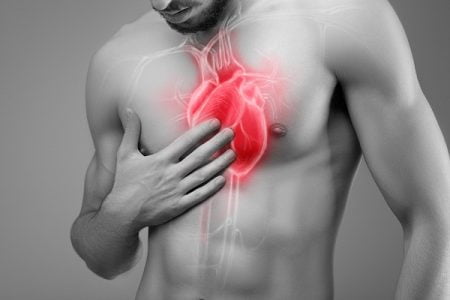What are the Causes of Enlarged Heart (Cardiomegaly)?
- Updated on: Jun 10, 2024
- 2 min Read
- Published on Apr 19, 2021

What causes enlarged heart?
An enlarged heart is often caused by some other condition or disease, which puts extra stress on the heart causing damage to the heart muscle.
An enlarged heart can be caused by conditions that cause your heart to work harder than usual or that damage the muscles of your heart. Sometimes, the reasons for enlarged heart remain unknown.
A common cause of enlargement is stress during pregnancy, but in this case, the cause is temporary, so the damage isn’t long lasting.
A congenital heart condition, damage from a heart attack or an abnormal heartbeat (arrhythmia) can also cause enlargement of your heart.
What are the diseases that can cause your heart to enlarge (Cardiomegaly)
- Congenital heart conditions — when you are born with an enlarged heart or born with a condition that cases heart to enlarge
- Abnormal heartbeat (arrhythmia)
- High blood pressure (hypertension): blood pumps with more force than usual through the arteries. This puts stresses on your heart. Causes of high blood pressure are obesity, poor lifestyle, and unhealthy diet.
- Pulmonary hypertension
- Cardiomyopathy –
- Anemia – low red blood cells
- Thyroid problems: such as hyperthyroidism
- Alcohol abuse
- Kidney disease – such as chronic kidney disease
- HIV infection
- Abnormal heart valves
- Conditions that damage the valves may cause your heart to enlarge
- Infections of the heart
- Damage from a heart attack – a heart attack increases your risk of developing an enlarged heart
- Fluid around your heart (known as pericardial effusion) – accumulation of fluid in the pericardium that contains your heart may cause your heart to enlarge
- Excessive iron in the body (hemochromatosis)
- Certain rare diseases such as amyloidosis
- Blocked arteries of the heart (coronary artery disease) – plaques deposit in your heart arteries, which affect the blood flow through your heart vessels. This can lead to a heart attack or death of a section of your heart muscle. This causes the heart to pump harder to supply enough blood to the body, causing it to enlarge.
- myocarditis – it is an infection of the heart that is generally caused by a virus
- cardiac ischaemia – reduced blood flow to your heart. It causes heart pain (angina)
- obesity – too much body fat is a risk factor for high blood pressure, which can cause the heart to enlarge
- old age – as we get older, our arteries lose some of their elasticity and they do not remain as effective as in the young age. This stiffening of blood vessels causes high blood pressure, which in turn causes heart to enlarge.
An enlarged heart can be treated if diagnosed earlier. It is also possible to reduce the rate of its enlargement over time if appropriate treatment is provided. Many medicines used to treat high blood pressure will also reduce heart muscle size if it is enlarged.












